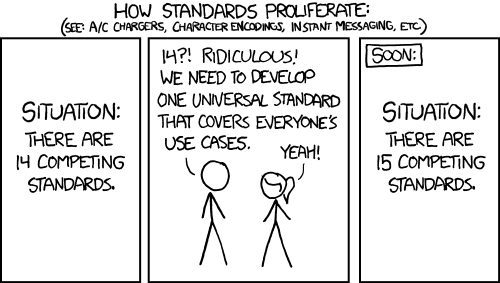Why are there so many programming languages? And why are there still being so many made? I would think you would try to perfect what you have instead of making new ones all the time. I understand you need new languages sometimes like quantumcomputing or some newer tech like that. But for pc you would think there would be some kind of universal language. I’m learning java btw. I like programming languages. But was just wondering.
A given programming language often has limitations which are largely different than the limitations from others. This means that different languages are often used on different kinds of problems. Want something fast, use C. Want to write something quickly, use python. Want it to run on just about anything, use Java. And so on.
So why don’t we make one ultimate one or a few that fulfill all needs? Well, partially because we haven’t figured out how to do that, but also it’s really easy to learn yet another language once your understand how they work. I can write in python, js, c, c++, c#, Java, kotlin, rust, perl, ruby, php, forth, lisp, and I could keep on going for quite a while. The underlying concepts are largely the same and so picking up a new language is no big deal (though being good at it is a bigger deal). We have so many because ultimately it just doesn’t really matter that we have so many.
I know a handful of languages and I think of them as tools. For example, a flathead screwdriver will work on a phillips screw head (In most cases with some outliers), but a phillips screwdriver might just be better for the job. Same with a wrench and a socket with a ratchet, etc.
When it comes to programming or scripting I approach it in the same way. If I am at work, and I need to automate something quick and dirty, no end user will need to use it, and it is just adjusting data or spitting data back at me, I am probably going to write it in Python.
Or, if I need to make something that an end user is going to interact with, I am probably going to spin up a web server and use the MERN stack to create that.
If I am working at home on a TUI for my favorite application, I am going to use Rust or Python
And if I working on a project that requires me to work with embedded systems, I am probably going to reach for C, maybe C++ depending on the support, and I have in a couple of instances needed to use Assembly.
All this to say, I think that if I had to use Python for all of these, I would be in trouble. Same as if I had to use C++ to accomplish all of the above. Could it be done? Sure. Do I want to do that? Not at all.
That’s why everyone actually codes in lisp.
Not enough parentheses in your reply.
Without new programming languages we would still be using FORTRAN, AGOL and LISP.
https://fortran-lang.org/learn/quickstart/hello_world/
https://lisp-lang.org/learn/first-steps
One reason why new languages are developed is the creation of a “Domain-specific language” or DSL. See Wikipedia for more information.
Programming languages are tools you pick the one for the job, there are situations where Java’s garbage collection could be a problem so it would not the right tool to use.
There are a lot of people with a lot of opinions and preferences that are trying to do a lot of different things in a lot different ways. The same reason we have so many of anything.
Why invent the screwdriver if you have a hammer
What kind of screwdriver though? Torx are superior.
Robertson would like a word.
No doubt they are probably better overall, especially when considering manufacturing. But I swear parts of my house where built with scraps (or the last guy was just a sociopath) and most of the time I encounter them it’s in some rare ass instance and it just pisses me off.
Last time was when servicing my AC I noticed the breaker was bad (ie wouldn’t reset ). So I had to swap it and by code I needed to swap the box it ran on since it was showing signs. Sure enough 1 of 4 screws holding it to the side of the house is a fuckin Robertson head. So I was neck deep in fixing shit and had to stop and go find my random cup of bit heads out in the shop.
Now I just carry a bit if I can remember it. But it’s hard to find screws sometimes so I just don’t use it to avoid exacerbating my own problems.
In a lot of cases it feels a lot more like my mother in law buying me a new multi-tool every Christmas
Damn…
deleted by creator
Long has man wanted to experiment with as many partners as he can.
Some languages have a obligation to support older versions, provide upgrade guides. They have old baggage in the forms of old systems or processes that they can’t just abandon.
Sometimes it’s easier to just start over from a clean slate. Experimenting and seeing how it works. If it fails well you haven’t inconvenienced millions of users.
It’s all about experimenting, trying to see what works, what it’s good with and what it’s not good with. A language like Java can’t just change to experiment things. Some people are also fixed to the style and methodology that Java provides.
Aside from that, hobby languages are just hobbyist stuff.
Quite a few languages that are major players now started as hobby languages.
deleted by creator
I think PHP has a bad rep 'cos it tried to be everything to everyone… if you maintain a certain standard (i.e. always do the same thing the same way) and avoid deviating it’s actually a pretty cool language.
deleted by creator
You can’t easily improve a language and stay compatible with the previous versions. C++ does it but they are crazy.
you would think there would be some kind of universal language
It does not exist, but anyone is free to try and invent it. It should be low-level like assembly and high-level like BASIC, functional, object-oriented, and have weird stuff like traits, concepts, and alien features from Haskell. It must also have both the pointers/references of C++, and the borrow checker of Rust. And don’t forget to make it as secure as Ada with pre and post conditions. But it must still be easy to use. Also you will have to write a compiler for every operating system ever (mainframe, server, desktop, iOS, Android, every phone, every tablet), and contain a universal GUI that pleases everyone. It’s literally impossible to do right now.
Last but not least, Java was supposed to be this universal language that you can run everywhere. It failed and it cannot be run everywhere. It also had to be improved a lot, and it’s missing a fuckton of features from every other language.
It should be low-level like assembly and high-level like BASIC, functional, object-oriented, and have weird stuff like traits, concepts, and alien features from Haskell. It must also have both the pointers/references of C++, and the borrow checker of Rust.
Hang on a minute. Isn’t that literally just
RustCrabLang?Rust still lacks OOP (the inheritance/subtyping part of it) though. And some more advanced Haskell features too, like HKT.
I’ll take your word for it about the missing Haskell features, but with regards to inheritance, they deliberate chose to avoid it. They use an alternative model to achieve the same goals inheritance is meant for, but without the issues that come along with it. Their approach is basically a more advanced version of how Go uses interfaces to define shared behaviour.
Ooh rust just became more appealing to me.
It is pretty neat. They’ve made a lot of really interesting design decisions that make for a pretty unique language.
One of its main selling points is how it guarantees memory safety without using a garbage collector. That, plus the fact that it does a shit-ton of compile-time optimizations, actually makes it pretty fast. Like, 80%-90% as fast as C (which is much faster than all the other high-level languages like Java, Go, etc, partly because they do in fact use garbage collectors).
If you want to check it out, I recommend this playlist as a solid intro.
Here is an alternative Piped link(s): https://piped.video/playlist?list=PLai5B987bZ9CoVR-QEIN9foz4QCJ0H2Y8
Piped is a privacy-respecting open-source alternative frontend to YouTube.
I’m open-source, check me out at GitHub.
Oh yeah, I get all of those, because I am a Rust programmer myself who hates OOP. :D
I raised the topic up only because of how people were talking about “the ultimate language with everything”.
I’d call it Paradox Lang, or PL for short. It even has features that are contradictory to each other, you just have to declare which mode you want at the top of every file. Can you imagine. :)
The only feature it doesn’t have is “lightweight and minimal language”.
easily improve … C++
I assure you that there is absolutely nothing easy about the C++ standardization process, lol.
Such an abomination could be created. Just imagine all the over engineering that would be required.
It would run ANYTHING on ANY platform by incorporating every libc and assembler and VM and dynamic interpreter.
It runs on EVERY platform and thus it can be adequately tested on NO platform.
Also, by the time you’ve gotten it to compile, another two versions have come out.
There are no stable releases, just a continual rolling build from the single bespoke server farm that can create releases
There is a time when you are solving/coding for a specific domain and you quickly start metaprogramming (coding a code generator). That’s the moment when you write your own Domain Specific Language. They have a tendency to grow and evolve. In time some of them become full blown programming languages themselves.
My suggestion, learn a few from different paradigms. They are more than eye opening.
you would think there would be some kind of universal language

There is an xkcd for everything
JavaScript (is the universal language) (is also the answer of why there are so many languages)
If there was a single language, afterwards the same broken logic would be applied to frameworks and libraries, and we all know how many people bitch and whine over Java and it’s extensive standard library.
I actually don’t think that’s the case for languages. Most languages start out from a desire to do some specific thing better than other languages rather than do everything.
And then there was python. Designed to be designed.
You got to it before I did. Programming languages are like vehicles. You wouldn’t take a sports car off-roading, and you wouldn’t expect a tractor to win a drag race. There is a lot you can do with an all-purpose vehicle, but it’s not going to be as good as something that is purpose-built for a single task.
let hem keep at it. I haven’t found an easy and verstile language as Python than can compile to byte code and be as fast a C ! I know it is coming anytime now despite having been waiting for over a decade.
🐍 gang
I won’t claim it’s as easy as Python, but that’s the rough area that Nim is aiming for. Going from dynamically typed to statically typed is always going to be kind of painful, but I’ve liked the language overall.
Also, we have a Nim community here, if anyone is interested: https://programming.dev/c/nim
I’m not sure it can really be as fast as C in general.
The same reason anyone creates a new product in an existing market - they want money.
For which language do you have to pay the language inventor to use it?
- That sentence may be grammatically … questionable …, but I don’t know how to write that correctly now.
Coldfusion (Adobe) comes to mind. There is an open source CFML version or two, but the real deal is a bit pricey. It’s mostly used by government, higher ed., and healthcare. It’s not terrible, but it was cooler when it was younger IMO.
If you invent a language and it takes off, you’re literally the expert on it and will reap the financial windfall of that.
That sentence seems correct. As for your question, you’d rather have to ask yourself: When would you pay for a programming language?
Back in the old days before internet and commodity hardware, before easy distribution, before non-trivial software, before basic compiler knowledge was common people were easily impressed, so naturally you could sell your compiler for primitive grug BASIC.
Today, that situation is different. A language by itself is meaningless, a risk, even, in some ways. A while back some developer of REM Objects was bitching about in the old aggregator on how nobody wanted to spend money on their special proprietary BASIC. Like it was just another product. They don’t know
how to use a computerhow programming languages work. This extends to even finding users willing to use your stuff for free. I don’t want to knock on REM Objects in particular, you know you could add way more examples like Seed7, every lisper ever etc., but let’s get into why people pay for programming languages.- extreme vendor lock-in of platform, hardware, whatever (but you almost always have your language bundled with something else in the first place, because…)
- the point is a feature beyond the language (think matlab, labview, SAP, Excel or Coldfusion 8bitguy mentioned)
- dubious support contracts (think Oracle JDK)
- enthusiasts you can milk for life support and dumbfucks that fall for your next gen graph AI DSL whatever bla
- extremely great developer experience (but we live in an age where megacorps create languages and infrastructure for improved experience for free, so, good luck with that these days)
I’ll bite the bullet: I’m making my own scripting language for fun, as a learning experience and a tool for my own projects. If it can help others, great! But that’s not my main goal.
In nearly 5 years working on it, I’ve made at most 400$ from donations and grants. Open source isn’t a viable source of income, no matter what ; and programming language dev is even less profitable.
We should make one programming language to rule them all!
No idea, HolyC is the only language we need.
HolyC and Brainfuck are for noobs, I only use Whitespace

















